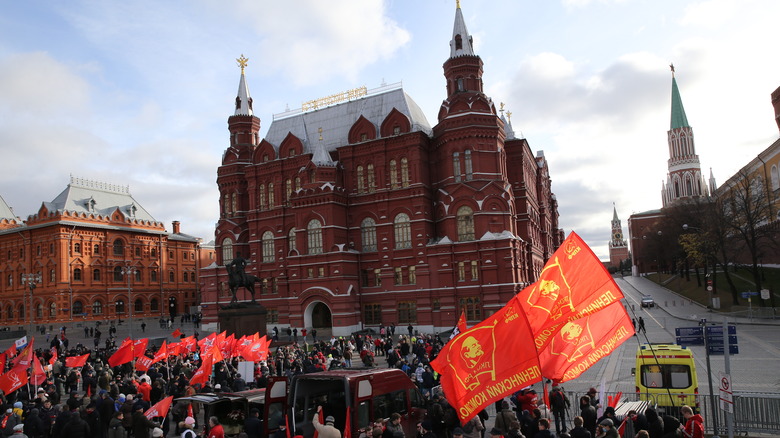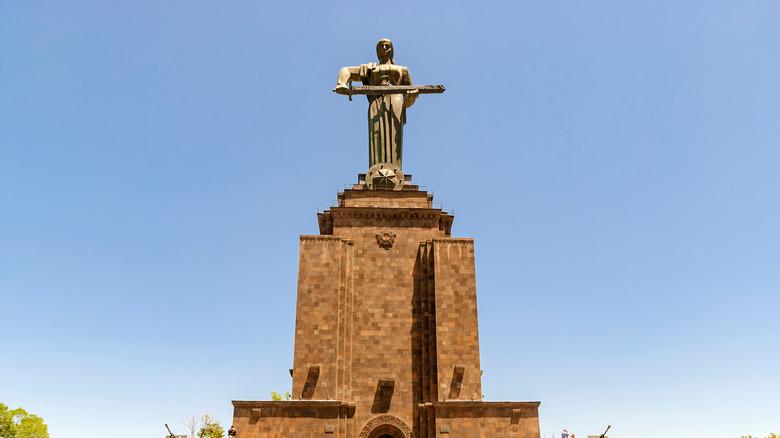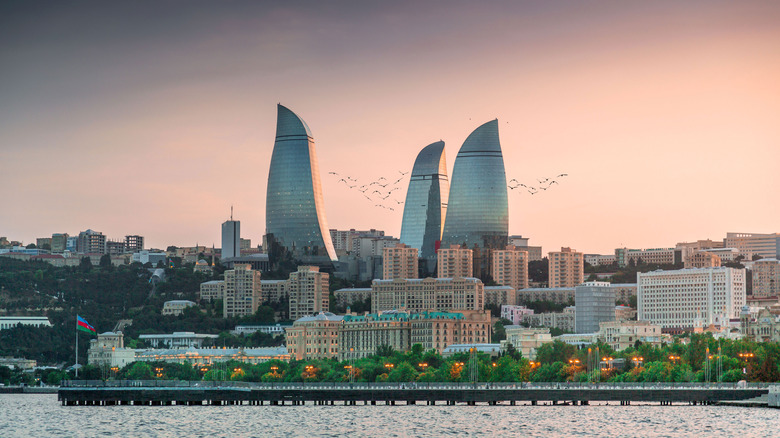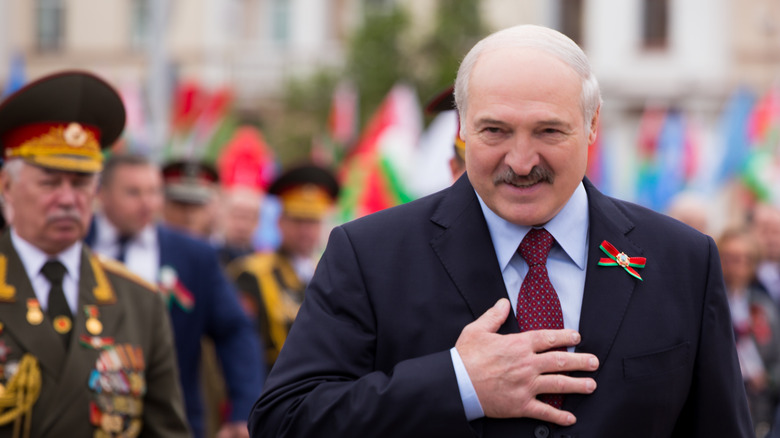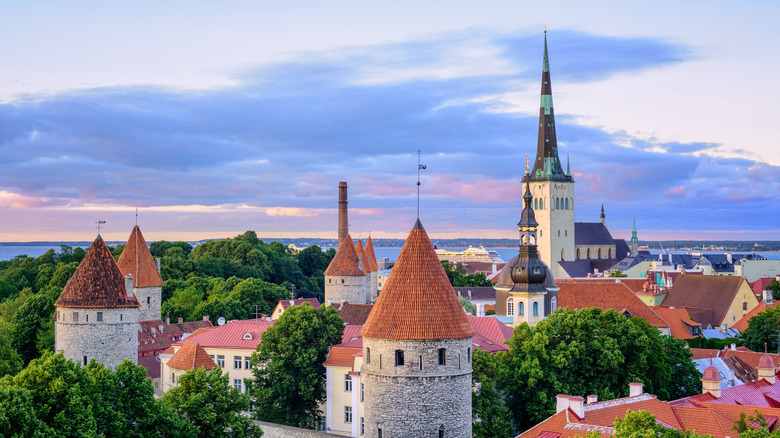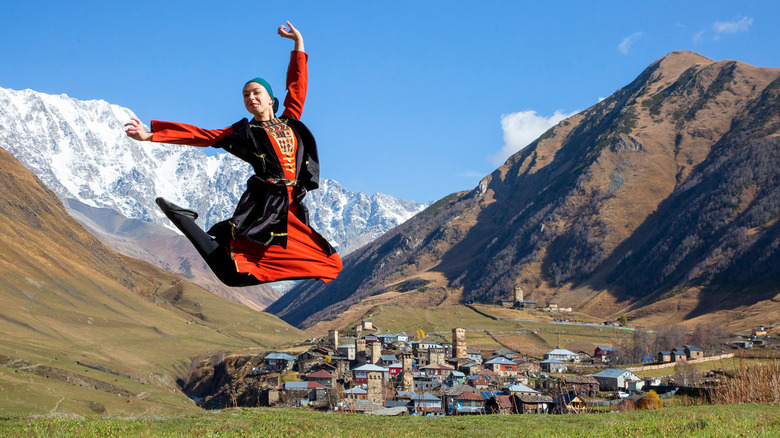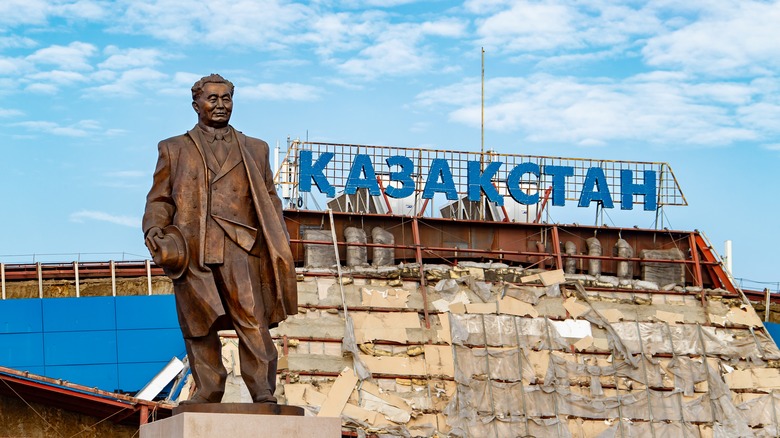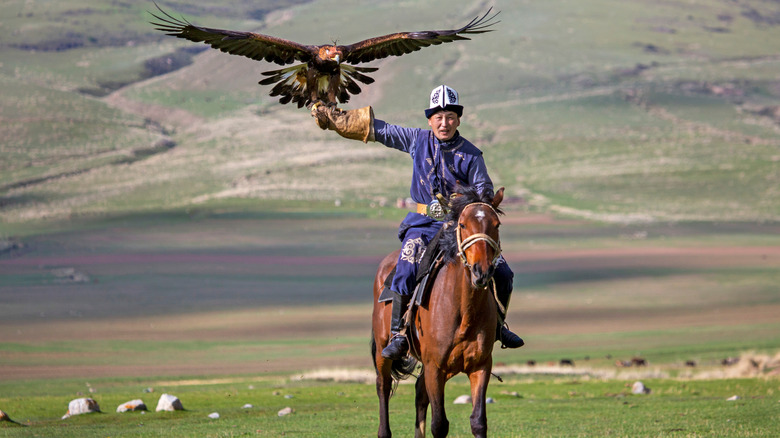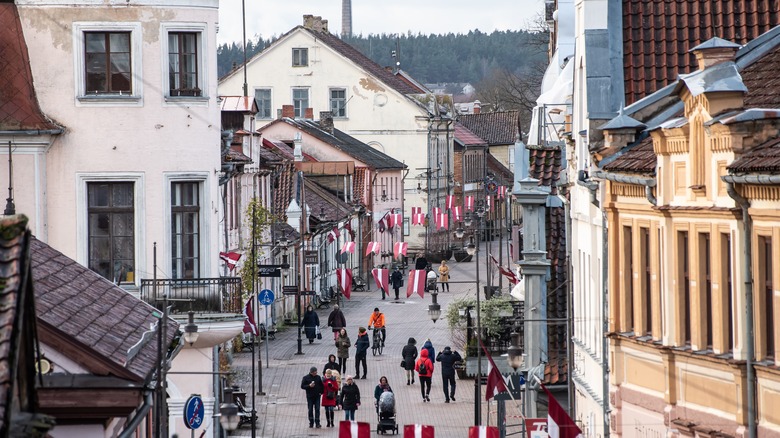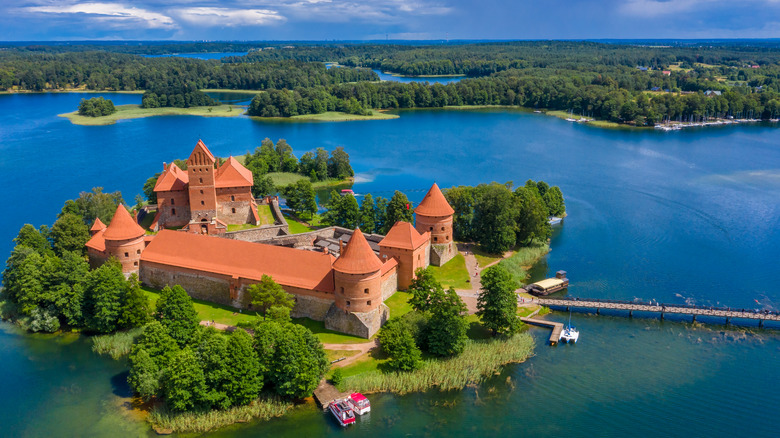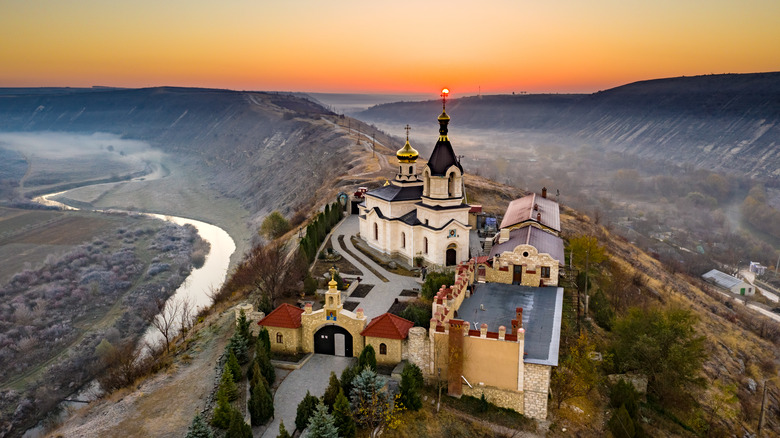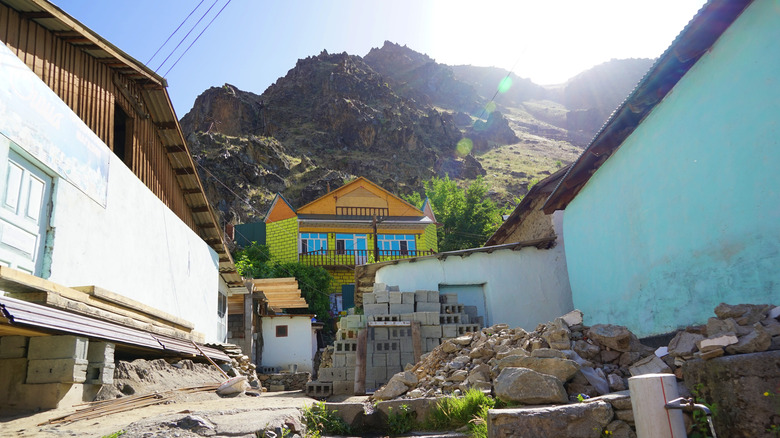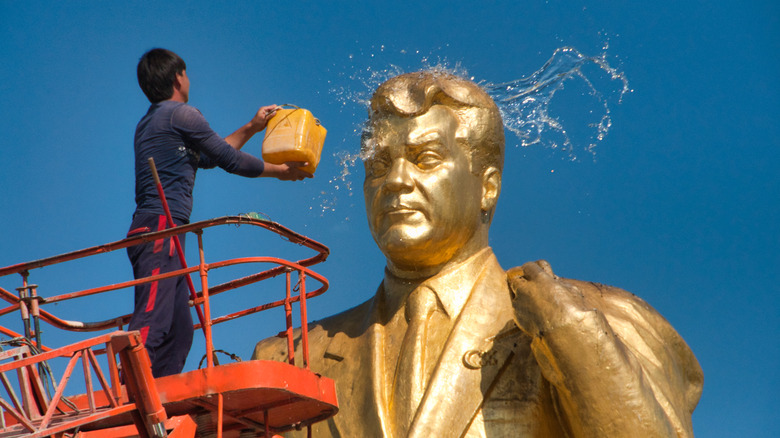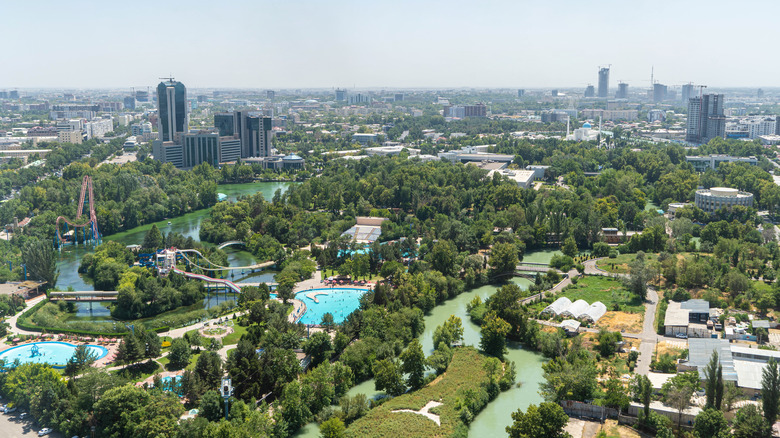What Happened To The Post-USSR Countries?
From 1946 to 1991, the Union of Soviet Socialist Republics, or U.S.S.R., covered almost one-sixth of the planet's land surface, spanned 11 time zones, and had longer frontiers and coastlines than any other country in existence, per Britannica. In 1991, a combination of economic and political upheavals, in no small part helped along by Western governments, pushed the Soviet Union to fragment into its 15 formerly component republics.
The original and largest of these socialist republics, Russia, certainly had a rollercoaster ride through economic depression and political restructuring, before stabilizing in the late 1990s. But for the first time in the best part of a century, the remaining 14 newly independent nations were expected to chart their own course, economically and politically, without the support of a centrally managed government and economy. Whether deciding to remain close to Russia, reach out to the West, walk a tightrope between the two, or isolate altogether, some fared better than others over the years. War and political upheaval affected many of these nascent countries, even through the end of 2021, the 30th anniversary of the breakup of the Soviet Union.
Armenia
As independence dawned in September 1991, Armenia was still recovering from a major earthquake in 1988 that leveled the city of Spitak and crippled Armenia's infrastructure, as described by the World Bank. Following the end of Soviet rule, the autonomous region of Nagorno-Karabakh, straddling the border between Armenia and Azerbaijan, declared independence and called on Armenia for support, per Britannica. The subsequent war left Armenia with plenty of occupied land but without vital natural gas, which Azerbaijan had cut off, resulting in an energy crisis that plunged Armenia further into the economic doldrums, as reported in The New York Times.
A ceasefire in 1994 gave Armenia a chance to begin to rebuild, including its sole nuclear power station, damaged in the 1988 earthquake, which was brought back online in 1995 according to the World Nuclear Association. Nonetheless, recovery was slow until the turn of the century, which was dramatically marked in October 1999 by the assassination of the prime minister and other high ranking members of parliament in the parliamentary chambers, as reported by CNN. This left the nation traumatized and pushed into the autocratic bosom of President Robert Kocharian, as detailed by RadioFreeEurope/RadioLiberty.
With gradual government reforms and continued fighting in the Nagorno-Karabakh region, the latter of which was overrun by Azerbaijan in 2020, per the International Crisis Group, the 21st century saw slow economic growth and over a quarter of the population still lived below the poverty line as of 2019, per the World Bank.
Azerbaijan
Rich in oil and corruption, according to the BBC (as well as being the birthplace of chess grandmaster Garry Kasparov, per the Guardian), Azerbaijan found itself in a bitter war with Armenia over the disputed autonomous Nagorno-Karabakh enclave almost immediately after the Soviet Union dissolved in 1991, per Britannica. Sitting on the border, the region had been rife with ethnic trouble for years, and in 1992, with the Soviet order gone, Armenian tanks swept in to take control of it and much of the surrounding area (via Human Rights Watch), which it held until 2020 when Azerbaijan took it back.
Rather than pursue a path to democratic self-governance, after two overthrown governments in two short years, Azerbaijan instead turned to the former communist ruler Heydar Aliyev, who took over in 1993 and held on long enough for his playboy son Ilham Aliyev to take over, creating the first post-Soviet family dynasty, per the Washington Post.
Glam, glitter, and a global audience accompanied the arrival of the popular annual song competition Eurovision to Azerbaijan in 2012, who found themselves under unusual and unwelcome scrutiny, per Aljazeera, as international media such as the BBC threw a spotlight on the Aliyev dynasty's repressive government, including the forced demolition of homes to make way for the event.
Belarus
In 1991, in Brest, Belarus, a declaration was made by representatives from Russia, Ukraine, and Belarus that the Soviet Union no longer existed, per Britannica. Fast forward through three years of post-independence political wrangling, and the first free election in Belarus took place in 1994, sweeping Alexander Lukashenko into the presidency on a populist, anti-corruption ticket, per Reuters (via the New York Times).
It was also the last free election in Belarus, as Lukashenko soon got to work making sure every subsequent election would go in his favor, no matter what, as described by RFE/RL. A hunger strike by the country's parliament to oppose his dictatorial ambitions in 1995 was ineffectual, and in 2006 Lukashenko unabashedly told a gathered crowd, "What can you do? You'll elect me."
Dubbed "Europe's last dictator," Lukashenko has kept his nation firmly aligned with and dependent on Russia, per UNDP, as well as his people under his autocratic thumb. He shows no signs of letting up: In 2021, Lukashenko forced an international flight to divert to Minsk just so he could arrest a dissident journalist, as described in U.S. News and World Report.
Estonia
Cultural buddies with Finland, according to OECD Regional Development Working Papers, Estonia emerged from its Soviet past remarkably well, along with its neighboring Baltic states Latvia and Lithuania. Despite being the smallest of the post-Soviet states, it ended up being both the least corrupt and most prosperous of them all, as described in The Guardian.
Not all is rosy in this diminutive Balkan state though, as once it gained EU membership in 2004, per Britannica, a large slice of the younger population chose to take the opportunity to emigrate to other EU countries.
Meanwhile, tensions in the culturally Russian-dominated border regions continue to simmer. Approximately one-quarter of the population of Estonia is ethnically Russian, according to NPR, and they have at times spoken out against initiatives by the government to disenfranchise Estonian Russians, including the reduction of school classes taught in Russian and restricting citizenship access to ethnic Russians who immigrated to Estonia in Soviet times. These protests have turned violent too — notably in 2007 over a World War II monument that was being relocated from the capital Tallinn, an act that ethnic Russians felt disrespected their efforts during the war. The clash left one dead and many injured.
Georgia
The decade following independence was a rough ride for Georgia. In addition to a brief civil war that tore through the capital Tblisi in 1991, covered by the Washington Post, two self-declared autonomous regions, Abkhazia and South Ossetia, continued their efforts to achieve self-governance in separate conflicts. These both attracted Russian attention and ultimately military intervention to broker a ceasefire in 1994, per the Center for American Progress.
The Rose Revolution in 2003 followed years of corrupt and incompetent government, which had caused economic decline and a rogues' gallery of winters without heating or electricity, per the Commission on Security and Cooperation in Europe, carrying Mikheil Saakashvili into the presidency. When Saakashvili began courting the EU and NATO, in 2006 Russia stopped buying their wine and mineral water for six years, per The Guardian, and in 2008 they went to war, again, over South Ossetia, writes Britannica. Saakashvili himself turned to a more bully-boy method of governance and eventually retired in 2013 following his loss of majority control. The Georgians were not willing to forgive and forget though, arresting Saakashvili in October 2021 for abuse of office, per the New York Times.
Kazakhstan
With a significant Russian minority, strong ties with both Russia and China, as well as vast reserves of oil, Kazakhstan has seemingly prospered economically but less so politically, as described in a report in The Guardian. The nation was ruled by Nursultan Nazarbayev since independence in 1991, who was subsequently granted "father of the nation" status in 2010, with accompanying immunity. Thanks to his efforts in guiding constitutional revisions, elections, and quashing reform movements, Nazarbayev remained in power for over two decades until his resignation — but not before he picked successor Kassym-Jomart Tokayev to take the reins. The latter promptly put Nazarbayev's daughter second in the line of succession and renamed the capital city Nur-Sultan in his predecessor's honor, per Britannica.
Nazarbayev inherited a nuclear arsenal of 1,410 warheads and was able to impress Western governments by voluntarily surrendering these back to Russia, as reported by E-International Relations. His influence persisted into his post-presidency years, per Reuters, though a large rich-poor gap and accompanying violently quelled strikes resulted in him taking a lower profile in 2022.
Kyrgyzstan
Following independence, Kyrgyzstan got off to a good start, with the physicist Askar Akayev in charge, and liberal policies and stability in the first few years of independence, per Britannica. Power corrupts though and, after re-election in 1995, Akayev picked up the dictator playbook and began expanding his powers, as described by the Guardian. Beginning with regulations on press freedom (via the Committee to Protect Journalists), Akayev also oversaw the arrest of opposition politicians, leading to one protest in 2002 that ended with six demonstrators shot dead by local police.
The government has since been heaved over three times, starting with the toppling of Akayev and his government in 2005 during the Tulip Revolution. His replacement, Kurmanbek Bakiyev, was run out of the country in 2010, and the third crisis in late 2020 plucked convicted kidnapper Sadyr Japarov from prison, according to Al Jazeera, and seated him in the comfy presidential chair soon after, as reported by the BBC.
Latvia
Through stringent, well-thought-out monetary policies and rapid privatization, Latvia quickly rode away from the hyperinflation and general economic woes that afflicted many post-Soviet states, according to a report from the Peterson Institute for International Economics. Trade and cooperation with Western Europe also created a path to EU membership in 2004, as well as joining with NATO that year. And in 2014 Latvia adopted the euro as their currency, as described by a report in The Guardian.
According to Transparency International, corruption in Latvia continues to be an issue, particularly in the financial sector, as per Bloomberg. Nonetheless, a banking fraud scandal in 1995 and 2008's financial crisis were among the few significant challenges Latvia faced in its post-Soviet years, as well as a drain of the youth emigrating to other EU countries that has continued since 2004, according to Politico.
Latvia has made steps to distance itself from its Soviet past, but ethnic Russians have pushed back, like in a 2012 referendum to make Russian an official second language, which ended up being firmly rejected, per Britannica.
Lithuania
Arguably the first domino to fall in the Soviet collapse and first to leave the party, Lithuania had taken the lead in declaring itself independent before all other Soviet republics, per Britannica.
Turning to the West and the other two Baltic states, Estonia and Latvia, a liberalized economy and growing trade links with Europe led to EU and NATO membership in 2004, as described by The Guardian, although this has created an issue of emigration by the younger population to other EU countries.
Tourists subsequently flocked to the coastal cities, attracted by low prices and stunning scenery. The first female prime minister, Dalia Grybauskaite, aka the "Iron Lady," was elected in 2009, and Lithuania gained respect for its commitment to democracy and human rights, per Freedom House. Despite the hearty economic growth of Lithuania, the nation is battling some of the highest rates of suicide and alcoholism in Europe, as reported by France24.
Moldova
Internal conflict was quick to tear into Moldova after independence, with separatists sympathetic to the old Soviet Union carving out a thin but significant strip of land sandwiched between the Dniester River and Ukraine, calling it the Transnistrian Republic, per Britannica. This began a conflict that has since been frozen for over 30 years, as reported by Carnegie Endowment for International Peace, with Russia taking a strategic peacekeeping role. But since Moldova started making overtures to the EU, it has found itself in diplomatic conflict with Russia, resulting in interruptions in natural gas supply and prohibitions on the export of Moldovan wine to Russia, as per Britannica.
Another separatist Turkic minority population, the Gagauz, also fought Moldova to gain autonomous status in 1994, as described in Balkan Insight. The continuous internal political and economic turmoil since independence have left Moldova one of Europe's poorest countries, according to the World Bank. The financial situation was not helped by a scandal in 2015, when it was discovered $1 billion (approximately 15% of the country's GDP) had disappeared from three of the nation's banks, forcing the state to bail them out, as reported by the BBC.
Tajikistan
Tajikistan wins the dubious prize of the poorest post-Soviet state. From the get-go, the nation was wracked by civil war between the former communist rulers and a coalition of Islamist and pro-Western groups, according to The Guardian, many of whom fled to Afghanistan and continued the fight from there, per Britannica. The nation did not find peace until 1997, under president Emomali Rahmon, who has continuously ruled the nation since 1992, as reported by RFE/RL.
Sitting on the northern border of Afghanistan, like other states in the region, Tajikistan staged U.S. and NATO forces during operations against the Taliban after 9/11, which helped slow the influx of militants from Afghanistan but also led to Tajikistan becoming a significant point of transit for Afghan-produced heroin and opium.
Rahmon has since consolidated his authoritarian grip on Tajikistan by removing term limits and banning any religious political parties, though he has also sought to take advantage of hydroelectric energy resources by committing to the construction of the Rogun Dam. Russia also maintains a considerable military presence with a large army division based near the Eastern border, per Reuters.
Turkmenistan
Sitting on the fourth-largest proven reserves of natural gas in the world, per NS Energy, from 1991 to 2006, Turkmenistan's Saparmurat Niyazov was not content to be just the president of the newly independent state. Creating a personality cult around himself, the self-proclaimed "Turkmenbashi" (Leader of all Turkmen) named months of the year after himself and his mother, and made his lifestyle guide, the "Ruhnama," required reading for students all the way to college level, as described in The New Yorker.
Despite Turkmenistan's considerable natural gas resources and the promise of foreign investment, it has been estimated that over half the nations gross domestic product was diverted away from essential infrastructure and instead spent on projects whose sole purpose was to emphasize Niyazov's prestige, including a giant golden statue of himself that rotates to continually face the sun, per Britannica.
His successor, Gurbanguly Berdymukhamedov, did away with the personality cult but still maintains an autocracy, with his own honorific title of "Arkadag" or protector, as reported by The Guardian.
Ukraine
Following independence, one of Ukraine's most immediately pressing concerns was what to do with all the ex-Soviet nuclear weapons it now possessed, having effectively become the third-largest nuclear power in the world, per Britannica. After prolonged negotiations and intense diplomatic pressure, agreements were made with Russia and the U.S. to guarantee Ukraine's security, and it began to disarm in 1994.
The next 10 years from 1994 to 2004 saw slow reform and a stagnating economy under Leonid Kuchma. A protested suspicious election win by pro-Russian candidate Viktor Yanukovych led to the Orange revolution in 2004 and the election of Viktor Yushchenko instead, as described by The Guardian. Six more unproductive years followed, after which Yushchenko's old political opponent Yanukovych took the presidential reins, before he too fled and was replaced by pro-Western billionaire Petro Poroshenko in 2014.
The result of another perceived swing towards the West prompted Russia to forget an agreement made in 1994 and annex Crimea in 2014, before moving one-tenth of its entire army to the Ukraine-Russia border in 2021, as reported by the New York Times.
Uzbekistan
Most populous of all the post-Soviet states with a population of over 30 million, Uzbekistan began its independence with old communist boss Islam Karimov in power, until his death in 2016, per Britannica. Like his neighboring leader Askar Akayev of Kyrgyzstan, Karimov began with honorable intentions to improve his nation but soon grew tired of pandering to political competition and by 1995 had eliminated any opposition (his successor continued the tradition), as reported by The Guardian.
Islamic uprisings in the 1990s resulted in further crackdowns, and a massacre of protesters by government forces in 2005 led the West to distance themselves politically, following a period of close strategic partnership during the U.S./NATO-led operations in Afghanistan. Prior to this, the U.S.-led coalition had remained largely silent on human rights abuses in Uzbekistan, at the direction of the host government, but the 2005 massacre forced a statement from the White House decrying the incident. The Uzbek government took a dim view to this unwanted criticism and subsequently gave the U.S. and NATO forces six months to pack their bags and leave, as described in another report by The Guardian.
